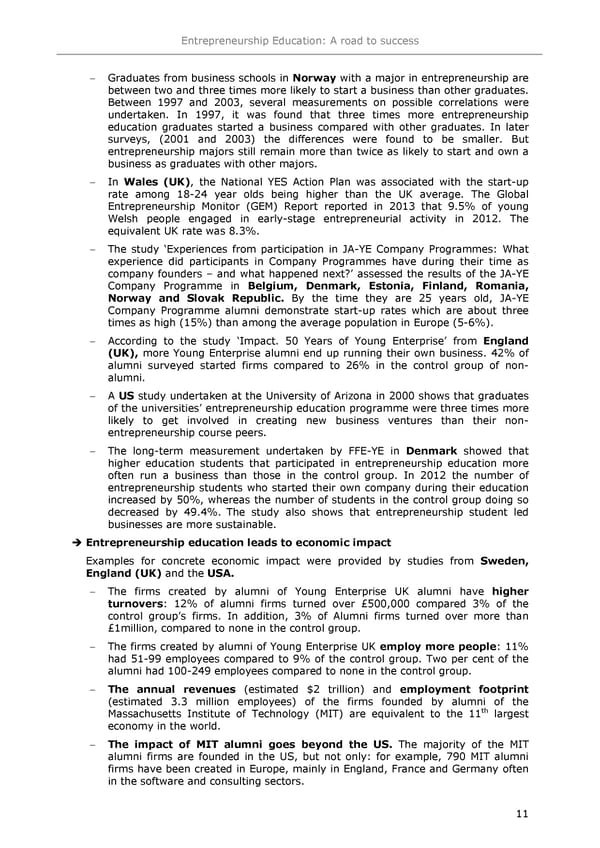Entrepreneurship Education: A road to success Graduates from business schools in Norway with a major in entrepreneurship are between two and three times more likely to start a business than other graduates. Between 1997 and 2003, several measurements on possible correlations were undertaken. In 1997, it was found that three times more entrepreneurship education graduates started a business compared with other graduates. In later surveys, (2001 and 2003) the differences were found to be smaller. But entrepreneurship majors still remain more than twice as likely to start and own a business as graduates with other majors. In Wales (UK), the National YES Action Plan was associated with the start-up rate among 18-24 year olds being higher than the UK average. The Global Entrepreneurship Monitor (GEM) Report reported in 2013 that 9.5% of young Welsh people engaged in early-stage entrepreneurial activity in 2012. The equivalent UK rate was 8.3%. The study 8Experiences from participation in JA-YE Company Programmes: What experience did participants in Company Programmes have during their time as company founders 3 and what happened next?9 assessed the results of the JA-YE Company Programme in Belgium, Denmark, Estonia, Finland, Romania, Norway and Slovak Republic. By the time they are 25 years old, JA-YE Company Programme alumni demonstrate start-up rates which are about three times as high (15%) than among the average population in Europe (5-6%). According to the study 8Impact. 50 Years of Young Enterprise9 from England (UK), more Young Enterprise alumni end up running their own business. 42% of alumni surveyed started firms compared to 26% in the control group of non- alumni. A US study undertaken at the University of Arizona in 2000 shows that graduates of the universities9 entrepreneurship education programme were three times more likely to get involved in creating new business ventures than their non- entrepreneurship course peers. The long-term measurement undertaken by FFE-YE in Denmark showed that higher education students that participated in entrepreneurship education more often run a business than those in the control group. In 2012 the number of entrepreneurship students who started their own company during their education increased by 50%, whereas the number of students in the control group doing so decreased by 49.4%. The study also shows that entrepreneurship student led businesses are more sustainable. Entrepreneurship education leads to economic impact Examples for concrete economic impact were provided by studies from Sweden, England (UK) and the USA. The firms created by alumni of Young Enterprise UK alumni have higher turnovers: 12% of alumni firms turned over £500,000 compared 3% of the control group9s firms. In addition, 3% of Alumni firms turned over more than £1million, compared to none in the control group. The firms created by alumni of Young Enterprise UK employ more people: 11% had 51-99 employees compared to 9% of the control group. Two per cent of the alumni had 100-249 employees compared to none in the control group. The annual revenues (estimated $2 trillion) and employment footprint (estimated 3.3 million employees) of the firms founded by alumni of the th Massachusetts Institute of Technology (MIT) are equivalent to the 11 largest economy in the world. The impact of MIT alumni goes beyond the US. The majority of the MIT alumni firms are founded in the US, but not only: for example, 790 MIT alumni firms have been created in Europe, mainly in England, France and Germany often in the software and consulting sectors. 11
 Entrepreneurship Education Page 14 Page 16
Entrepreneurship Education Page 14 Page 16